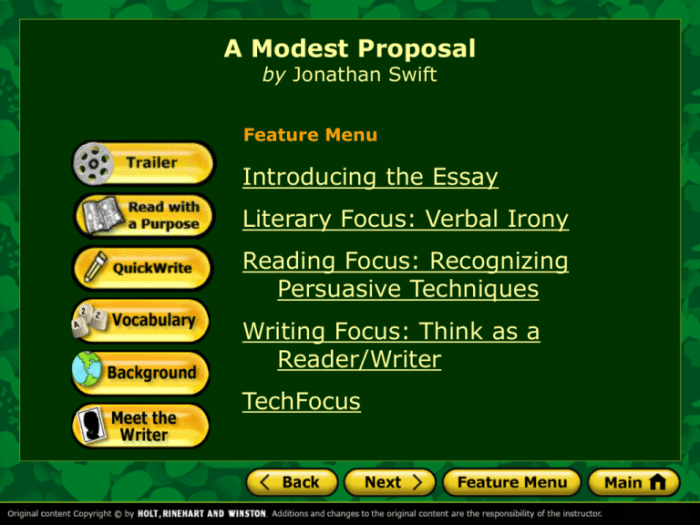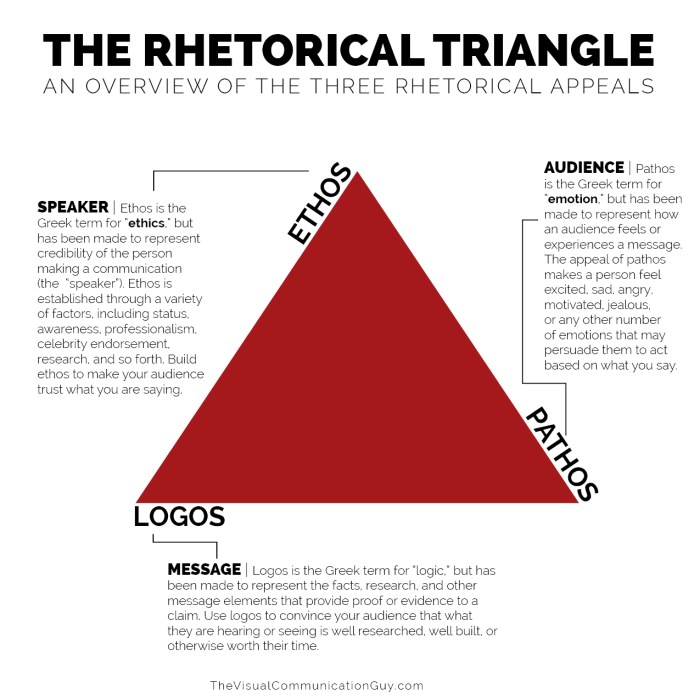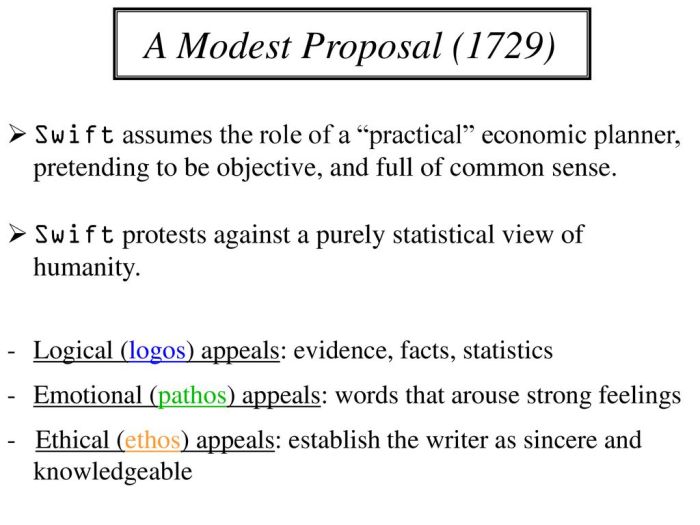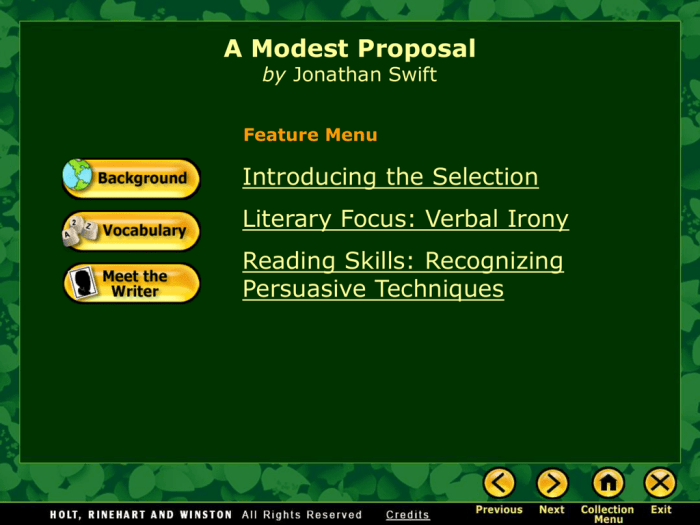Pathos in a modest proposal – Pathos in “A Modest Proposal” takes center stage as Jonathan Swift masterfully employs emotional appeals to craft a persuasive and deeply unsettling satire. This essay delves into the concept of pathos as a rhetorical device, examining how Swift’s use of it contributes to the effectiveness of his argument.
Swift’s poignant language and vivid imagery evoke a range of emotions, from sympathy to disgust, highlighting the plight of the poor and the absurdity of the proposal itself. Through pathos, Swift compels readers to confront the harsh realities of his time and challenges their complacency towards societal injustices.
Emotional Appeal in “A Modest Proposal”

Pathos, as a rhetorical device, is an appeal to the audience’s emotions, aiming to elicit empathy and emotional responses. Swift employs pathos throughout “A Modest Proposal” to evoke strong feelings in his readers, thereby bolstering his argument.
Swift’s Use of Pathos
Swift’s writing is characterized by vivid imagery and poignant descriptions of the impoverished Irish. He depicts the plight of the poor, particularly the children, in graphic detail, appealing to the readers’ sense of compassion and humanity. Consider the following passage:
“I grant this food will be somewhat dear, and therefore very proper for landlords, who, as they have already devoured most of the parents, seem to have the best title to the children.”
Pathos, an effective persuasive technique, is used strategically in A Modest Proposal. The author employs emotional appeals to evoke empathy and compassion in the reader. If you’re interested in further exploring this topic, you can refer to the history 1301 unit 1 exam for additional insights.
Returning to the analysis of A Modest Proposal, the skillful use of pathos underscores the author’s satirical intent and challenges the reader to confront uncomfortable truths.
By juxtaposing the landlords’ greed with the children’s vulnerability, Swift provokes a sense of outrage and indignation in the readers, effectively swaying their emotions against the landlords.
Pathos and the Effectiveness of the Argument
The emotional appeal in “A Modest Proposal” enhances the effectiveness of Swift’s argument by creating an emotional connection between the readers and the subject matter. By evoking feelings of pity, anger, and disgust, Swift compels the readers to confront the harsh realities of poverty and exploitation in Ireland.
The emotional impact of the essay makes it difficult for readers to dismiss Swift’s proposal as merely satirical or absurd.
Swift’s Use of Irony and Sarcasm: Pathos In A Modest Proposal

Irony is a literary device that involves stating the opposite of what is intended or expected. Sarcasm, on the other hand, is a form of irony that involves using humor to mock or criticize something.
Swift employs both irony and sarcasm extensively in “A Modest Proposal” to convey his message. For instance, he suggests that eating Irish children would solve the country’s economic problems. This is obviously ironic, as it is a horrific and inhumane solution.
Swift’s Use of Irony, Pathos in a modest proposal
Swift uses irony to highlight the absurdity of the English government’s treatment of Ireland. For example, he suggests that the Irish should be grateful for the opportunity to sell their children as food. This is ironic because it is clear that the Irish are not actually grateful for this “opportunity.”
Swift’s Use of Sarcasm
Swift also uses sarcasm to criticize the English government. For example, he refers to the English as “our brethren of England.” This is sarcastic because it is clear that Swift does not actually believe that the English are Ireland’s brethren.
Swift’s use of irony and sarcasm is effective in conveying his message because it forces the reader to confront the harsh realities of the situation. By using these devices, Swift is able to show the reader the absurdity of the English government’s policies and the suffering that they cause the Irish people.
The Role of Satire in the Essay

Satire is a genre of literature, and sometimes graphic and performing arts, in which vices, follies, abuses, and shortcomings are held up to ridicule, with the intent of shaming individuals, corporations, government, or society itself into improvement. Although satire is usually meant to be funny, its purpose is not primarily humor but criticism.
Satire can be found in many forms, including essays, poems, plays, films, and television shows.
“A Modest Proposal” is a satirical essay written by Jonathan Swift in 1729. The essay is a response to the poverty and famine that was widespread in Ireland at the time. Swift’s essay proposes that the Irish people should sell their children as food to the wealthy English landowners.
While the essay is clearly absurd, it is also a powerful satire of the English government’s indifference to the suffering of the Irish people.
Targets of Swift’s Satire
Swift’s satire in “A Modest Proposal” is directed at several targets, including:
- The English government: Swift satirizes the English government for its indifference to the suffering of the Irish people. He argues that the government is more concerned with making money than with helping the poor.
- The Irish people: Swift also satirizes the Irish people for their passivity and their willingness to accept their fate. He argues that the Irish people are too willing to accept the status quo and that they need to be more proactive in fighting for their rights.
- The wealthy English landowners: Swift satirizes the wealthy English landowners for their greed and their lack of compassion for the poor. He argues that the landowners are only interested in making money and that they do not care about the suffering of the Irish people.
Swift’s satire is effective because it is both funny and thought-provoking. He uses humor to make his points, but he also makes sure that his readers understand the seriousness of the issues he is addressing. “A Modest Proposal” is a powerful satire that has had a lasting impact on Irish literature and politics.
The Historical and Social Context of “A Modest Proposal”

Ireland in the early 18th century was a land plagued by poverty, famine, and oppression. The Irish were subjected to harsh laws and economic policies that favored the Protestant ruling class, while the majority of the population lived in abject poverty.
Swift’s “A Modest Proposal” was written in response to these conditions. The essay is a satirical attack on the indifference of the English government and the Irish ruling class towards the plight of the Irish people.
The Social Conditions in Ireland
The Irish people lived in a state of extreme poverty. The majority of the population was dependent on agriculture for survival, but the land was often infertile and the harvests were poor. As a result, many people were forced to beg or steal in order to survive.
The Irish were also subjected to harsh laws and discrimination. The Penal Laws, which were passed in the 17th century, restricted the rights of Catholics and Dissenters. These laws made it difficult for Irish people to own land, vote, or hold public office.
The Economic Conditions in Ireland
The Irish economy was heavily dependent on England. The English government imposed tariffs on Irish goods, which made it difficult for Irish businesses to compete. As a result, the Irish economy was stagnant and unemployment was high.
The English government also took advantage of Ireland’s natural resources. The English exported Irish wool and timber to England, which further impoverished the Irish people.
Swift’s Response to the Conditions in Ireland
Swift’s “A Modest Proposal” was written in response to the desperate conditions in Ireland. The essay is a satirical attack on the indifference of the English government and the Irish ruling class towards the plight of the Irish people.
In the essay, Swift proposes that the Irish people should sell their children as food to the wealthy English. This proposal is obviously absurd, but it serves to highlight the desperation of the Irish people and the indifference of those in power.
Quick FAQs
What is the purpose of pathos in “A Modest Proposal”?
Swift uses pathos to evoke emotions and create a sense of urgency, compelling readers to engage with the essay’s message.
How does Swift employ pathos in the essay?
Swift uses vivid imagery, personal anecdotes, and emotionally charged language to appeal to readers’ sympathies and shock them into action.
What is the significance of Swift’s use of pathos in understanding the essay’s impact?
Swift’s use of pathos enhances the essay’s persuasive power, making it a memorable and thought-provoking critique of societal ills.

